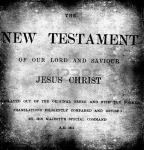|
IS THE BIBLE ANTI-SEMITIC?
By Steve Walton
I suspect that the usual readership of
The Shofar can take a pretty good guess at the answer to the title question.
However, Peter does exhort us, always being ready
to make a defense to everyone who asks you to give an account for the hope
that is in you (1 Peter 3:15). This article is presented for
edification in defense of the Word of God, wherein we find the words of our
hope.
Please note that the article was
copyrighted in 2005 ~ ed.
~
|
"Although [Paul] sees the Jews as having rejected
Christ, this does not lead him to hate them. It leads him to sorrow
and a love so deep he would be willing to go to hell for them
(Romans 9:1-3, 10:1). This is the model for our attitude towards the
Jewish people that the New Testament offers."
~ Steve Walton ~ |
Few recent films have
attracted more controversy than that surrounding Mel Gibson’s The
Passion of the Christ, a depiction of Jesus’ trial and death. It
has attracted accusations of anti-Semitism - of inflaming hatred of
Jews by portraying them as responsible for Jesus’ murder. This is an
extremely serious accusation. The history of Christian hatred of
Jews is appalling, and contributed to the murder of 6 million in the
Nazi death camps. Jews were referred to as “Christ-killers” by the
mobs that sought their lives, and Matthew 27:25 was used to justify
this. The concerns of Jewish leaders should not be dismissed
lightly. Anti-Semitism is on the rise in Europe, (we used to live
near a Jewish primary school - it had to be protected by barbed wire
and massive iron gates). Even if the film is not intentionally
anti-Semitic, we must understand why Jews are afraid, and do
everything we can to defend them.
But it is not only the film that has come under attack. Mel Gibson
apparently intended it to be true to the Gospel’s account of Jesus’
trial and death, and judging by first reports it is reasonably
faithful. Therefore, the attack on the film has become an attack on
the Bible, and many are now accusing the Gospels of being
anti-Semitic, of trying to pin the blame on the Jews, and especially
the high priests, when really it was Pontius Pilate and the Romans
who were at fault.
I hope to show that the Bible does not give the slightest foundation
for anti-Semitism. For a more thorough examination of this issue, I
would highly recommend Graham Keith’s book Hated without Cause? A
Survey of Anti-Semitism (Carlisle: Paternoster, 1997). But
before I answer the charge, I must say two things. First: I find it
fascinating that so many clergy want to exonerate the Jewish priests
and put the blame on Pilate. It’s safe to hate Pilate: he isn’t like
us, and he confirms all our prejudices about soldiers and
politicians. But the priests are too much like us. If they were
responsible, then that strikes too close to home. So some of those
attacking the gospels may not be as disinterested as they appear.
The second thing is this: I am myself of Jewish descent. According
to family tradition, we were cloth merchants in Manchester, and I am
a descendant of an Orthodox Rabbi called Solomon Isaacs. I am told
that many Ashkenazi Jews fled from persecution in Russia in the 19th
century, and settled in Manchester, so I suspect that my ancestors
were among them. Either Rabbi Isaacs’ daughter or his grand-daughter
was my great-great grandmother; she married a gentile and was
ostracised from the family. Some Rabbis believe that Jewishness is
passed through the female line, and in their eyes I would be
“technically” Jewish. I believe that Yeshua the Nazarene is the
Messiah God promised to my fathers.
So to the Gospels. Here we must face the truth, however unpleasant
it is. According to all the historical sources, the Jewish High
Priests were the instigators of Jesus’ judicial murder. There is not
a scrap of evidence that they were innocent, and the Romans were the
real culprits. This is true not only of the Gospels, but of the book
of Acts, and also of the Talmud, the collected writings of the early
Rabbis. According to the Talmud, Jesus was executed for “sorcery”
and leading Israel astray (b. Sanhedrin 43a, 67a). It makes no clear
mention of the Romans at all. So if the Gospels are anti-Semitic
because they put some of the blame on the priests, we are in the
ridiculous situation of saying that the Talmud is doubly
anti-Semitic because it puts all the blame on the Jews! To suggest
that the Jewish priesthood had nothing to do with Jesus’ death is to
stick our head in the sand.
This does not mean that the Romans are exonerated. I fail to see how
anyone can read the Gospels and think this. Pilate is portrayed as a
cynical, bullying coward who sacrificed an innocent man to save his
own skin, vainly trying to escape responsibility for his own
actions. Roman “justice” is exposed as self-serving imperialism.
According to Acts 4:25-27, the cross was a collaborative effort
between Jews and Gentiles - in fact an act of anti-Semitism, because
it fulfilled the ancient hatred of the nations for God’s chosen.
Therein may lie the solution to our problem.
The fact that the High Priests and the Sanhedrin (the Jewish ruling
council, comprised of both priests and Pharisees), plotted Jesus’
death, does not of course mean that the whole Jewish people can be
held responsible, or that the Gospel writers thought that they were.
The crowd that yelled “his blood be upon us and on our children”,
probably comprised simply the Jerusalem mob, and they did not have
the right to speak for the rest of the Jews. There is no indication
that Matthew saw this as making all Jews uniquely responsible for
Jesus’ death. This is confirmed by the speeches in Acts: when Peter
speaks of Jesus’ death to Jews in Jerusalem shortly after the
crucifixion, he accuses them of complicity in it (2:23,36, 3:13-14);
but when Paul is speaking to diaspora Jews many years later, the
note of accusation is muted (13:27-29- the blame is specifically put
on those who live in Jerusalem”).
It is true that John’s Gospel blames “the Jews” for the opposition
to Jesus. It may be, as has often been observed, that John is
written from the perspective of Galilee, and that for Galileans “the
Jews” meant “Judeans”- the inhabitants of the area around Jerusalem
(see John 7:1). In any case, John contains some of the most positive
statements about the Jews in the New Testament - including the
description of Jesus as “a Jew” in 4:9, and Jesus words in 4:22:
salvation is from the Jews. John
also records that not all of the Jewish leaders were hostile to
Jesus: Nicodemus the Pharisee protested against the plot to kill
him, and helped with his burial (7:50, 19:39).
This makes it very difficult to see John as anti-Semitic (for a
further defense of John, see Steven Motyer Your Father the devil?
A New Approach to John and the Jews (Carlisle: Paternoster,
1997). Indeed, the Gospels as a whole portray Jewishness as a
positive thing. There is little sign of the attempt to distance
themselves from Judaism that some critics have claimed to see. Jesus
affirms the Jewish law, (Matthew 5:17-18), habitually attends the
synagogue, (Luke 4:16), and takes part in temple festivals (John 7);
and Luke, normally considered the most “gentile” Gospel tells us
that Jesus was circumcised! No anti-Semite could have worshipped a
circumcised God. Above all, there is an overwhelming desire to show
that Jesus fulfilled the Jewish scriptures, and to persuade Jews
that he is the Messiah. This is especially strong in Matthew, the
Gospel that is often accused of holding all Jews responsible for
Jesus’ death.
There were anti-Semites in the early church; one of them, Marcion,
produced a version of the New Testament with all the “Jewish”
elements taken out (which makes it very short). But Marcion was
condemned as a heretic. The anti-Semites did not write the Gospels.
It is better to see the criticisms of Jews or their leaders in the
New Testament as part of a tradition of Jewish internal
self-criticism that goes back to the Old Testament. The prophets can
say the most ferocious things about God’s people, and portray them
as collectively under God’s judgment. But they always identify with
that people, and never doubt their election or God’s love for them
(for example, compare Hosea 9 with Hosea 11:8-9 & 14:4-8). The
Gospel writers wrote in the same way - and in this they followed
their Master. To describe the Gospels as anti-Semitic is blinkered
and anachronistic. I suspect that many of the academics and
journalists who make that charge are more interested in discrediting
Christianity than in the truth.
However, this does not quite get us off the hook. Because the New
Testament does not simply say that it was one group of Jews who
rejected Jesus. It does clearly say that his people as a whole
rejected him, and are responsible for that rejection. John 1:11:
he came to his own, and his own did not receive him.
Acts also accuses Israel of a corporate rejection of the Messiah
(Acts 4:27). Paul speaks of a collective failure of
Israel (Romans 9:31-33), and a
collective blindness that has come of the Israelites of his time
when the law is read (2 Corinthians 3:12-15).
With regard to John, whether by “Jews” John meant simply “Judeans”,
or was referring to the Jewish people more inclusively, it does not
follow that he was trying to turn them into objects of hatred. In
John 8:23, Jesus tells the Jews you are of
this world. This means that the Jews in John’s Gospel
represent the world. Their behavior is typical of the behavior of
the whole world, Jew and Gentile. Looking at them is like looking
into a mirror; they show us what we are all like. The world always
rejects Christ; the rejection of him by the Jews is one example of
this. Thus there is no excuse for turning the Jews into figures of
hatred who are uniquely evil. That would be pure self-righteousness,
which the Bible never condones for a second. Instead we should look
at them, and see sinners like us, mourn for our own sins and
rejection of Christ, and thank God for his mercy in forgiving us,
(this view of the Jews in John is taken from Michael Ovey “The Son
incarnate in a hostile world” in David Peterson, Ed., The Word
Became Flesh [Carlisle: Paternoster, 2003]).
With regard to Paul, we do not have space to fully examine Romans
9-11, where he explains his view of the Jewish nation. But we should
note that although he sees the Jews as having rejected Christ, this
does not lead him to hate them. It leads him to sorrow and a love so
deep he would be willing to go to hell for them (Romans 9:1-3,
10:1). This is the model for our attitude towards the Jewish people
that the New Testament offers, not a model of hatred and
anti-Semitism. How many of us can say that we have lived up to it?
Paul does not see the Jews as lost for ever; he believes that they
still have great privileges, and a place in God’s plan (Romans
9:4-5, 11:25-32). God still loves his ancient people and has a
future for them, a future that is bound up with Christ; the greatest
evidence of God’s love for the Jews is the gift of his son, and the
fact that some Jews still acknowledge him as Messiah (Romans
11:2-5). Finally, Paul does not see the Jews as uniquely sinful. The
conclusion of his argument in Romans 1-3 is that
all, both Jews and Greeks, are under sin.
Gentiles do not have the slightest reason to think that they are
superior to Jews, a point Paul expands on in Romans 11:17-24. But if
all are under sin then all are equally under God’s mercy: there is
now one way of salvation, by faith in Christ, for both Jew and
Gentile (Romans 1:16-17).
I hope I have shown that the Bible gives no foundation whatsoever to
anti-Semitism. Hatred of Jews is a vile evil. If any of us have ever
been guilty of the slightest hostility towards Jews, even if it was
just in the form of “innocent” jokes, then we have sinned and must
repent. Instead we should take every opportunity to show our love to
them (and in this respect, let me recommend the organisation,
Christian Witness to Israel, www.cwi.org.uk). When we look at the
cross we see what all of us have done to God - we have despised and
rejected Him. There is no room for self-righteousness, or pinning
the blame on one group. Yet we also see God’s love for Jew and
Gentile; and we see the terrible price of that love. We see one man
bearing the wrath of God in our place. For the final answer to the
question “who killed Jesus?” is “God did” -
it was the will of the Lord that he should suffer
(Isaiah 53:10). God loved those who hated him so much that he sent
his own dear Son to die - and his Son loved us so much that he
accepted the job.
| Far be it from me to boast
except in the cross of our Lord Jesus Christ, by which the
world has been crucified to me, and I to the world. For
neither circumcision counts for anything, nor
uncircumcision, but a new creation. And as for all who walk
by this rule, peace and mercy be upon them, and upon the
Israel of God.
~ Galatians 6:16
~ |
Is the Bible Anti-Semitic?
Copyright © 2005 AD
The Theologian
*
|
At the time of the writing of the article, Steve Walton was Vicar of Marbury, Tushingham, and Whitewell in the
Diocese of Chester, Church of England. More of Revd. Walton's
articles and many other informative articles may be found at
http://www.theologian.org.uk/. *
All
articles that appear in The Shofar have been reviewed and approved by the
AMC Board. Inclusion of an author
does not
imply
approval of all views of that author, some
of which may be unknown to the Board.
~ AMC Board |
Return to Home Page

|



